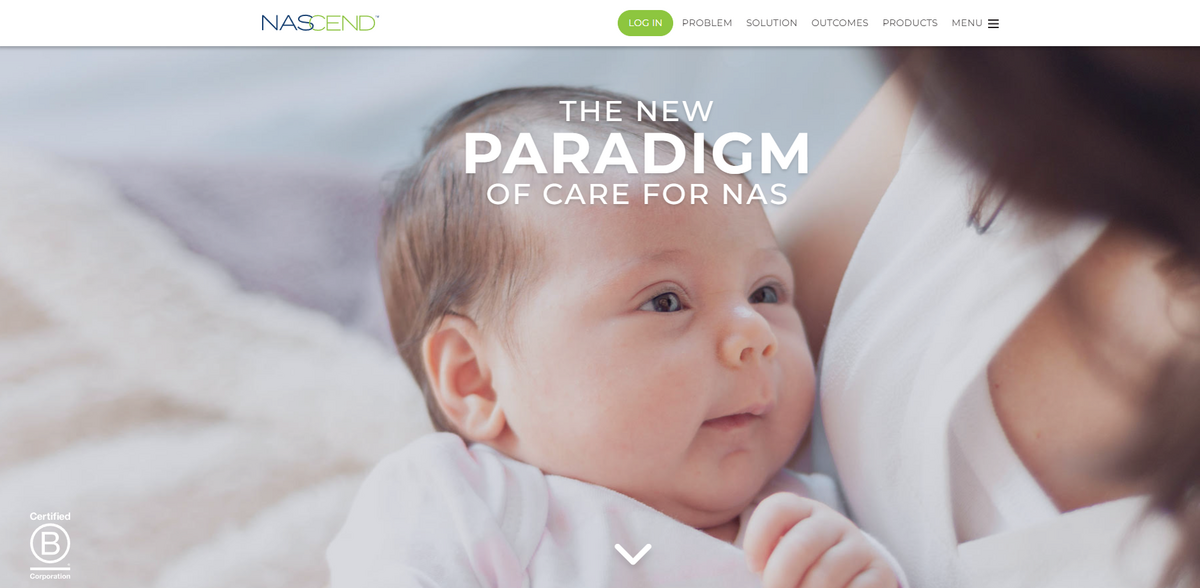What the Project Is
NASCEND is an innovative clinical solution, education, and technology company dedicated to improving outcomes for infants and families affected by maternal substance use disorder (SUD). The project targets one of the most pressing medical and social problems facing communities today: neonatal abstinence syndrome (NAS). Each year, an estimated 15% of infants are affected by prenatal exposure to alcohol or illicit drugs. In fact, one infant is born every 15 minutes requiring treatment for NAS, with an aggregate cost of care exceeding $2.5 billion. This groundbreaking project transforms the experience of NAS with technology, live training, evidence-supported guidelines, and family-focused intervention. It offers a comprehensive Continuum of Care that educates families as early as the first trimester, supports in-hospital newborn care, and follows through to 3-year developmental and nutritional follow-up.
Main Benefit
- 15% of infants affected by prenatal exposure to alcohol or illicit drugs.
- 1 infant born every 15 minutes requiring NAS treatment.
- Aggregate treatment cost exceeding $2.5 billion.
- 5.4% of women report drug use during pregnancy.
- 1 in 4 pregnant women have filled a prescription for opiates.
- 1 in 20 pregnant women are pregnant upon entering treatment.
- 1 in 20 pregnant women report current marijuana use.
- 3 in 5 substance-affected pregnancies are paid for by Medicaid.
- 6.3% of opioid-exposed infants have an IQ 2 standard deviations below normal.
- 17% of opioid-exposed infants are born prematurely.
- 60% of opioid-exposed infants require withdrawal treatment leading to additional opioid exposure.
- 78% of infants with NAS in the U.S. are covered by Medicaid.
- Average treatment cost per infant with neonatal withdrawal is $93,400.
Continuum of Family-Focused Care
At the heart of NASCEND’s approach is a continuum that begins early – as soon as the first trimester – and extends well beyond the delivery room. The model engages and educates families, providing ongoing support that reduces the need for intensive treatment, lower NICU admissions, and even shorter hospital stays. It is a system that not only treats neonatal withdrawal symptoms but also embraces comprehensive educational programs for parents, ensuring that families feel supported right from the start… the benefits cascade into improved transparency and overall provider satisfaction.
Innovative Technology in Care
NASCEND revolutionizes neonatal care with its commitment to technology-based support. The integration of live training and evidence-supported guidelines allows for real-time updates and learning opportunities that are easily accessible. Technology acts as a backbone, connecting clinical innovation with family care and ensuring that all stakeholders—from providers to the families themselves—have access to the latest information and best practices in the treatment of opiate-exposed infants. This merging of technology and clinical practice creates an engaging and dynamic environment that maximizes clinical outcomes while keeping care personable.
Addressing Substance Use Disorder
Substance Use Disorder (SUD) is at the core of the challenges faced by pregnant women and their infants. SUD, defined as a primary, chronic disease of brain reward, motivation, memory, and related circuitry, is characterized by genetic predisposition, significant self-deception, and a history of trauma, often compounded by co-occurring psychiatric illness. Pregnancy itself is a motivator for change, providing a critical window of opportunity where intervention can lead to treatment improvements. With support, the period of pregnancy becomes a pivotal point to seek treatment for substance use disorder. NASCEND places a strong emphasis on understanding and managing SUD in order to mitigate the adverse effects on both the mother and her baby.
Enhancing Neonatal Care and Family Engagement
The comprehensive strategy employed by NASCEND goes beyond immediate clinical intervention. It strives to create an atmosphere of family engagement, ensuring that the support extends into developmental and nutritional follow-up well into the child’s early years. Newborns are not labeled as addicts; instead, they are given comfort measures and, when necessary, opiate medication to address withdrawal symptoms that occur when the exposure stops after birth. This approach underlines a compassionate model that views newborns as vulnerable patients requiring gentle, evidence-based care, and highlights the importance of early intervention in reducing long-term healthcare costs and improving overall outcomes.
Project Impact
- SDG 3: Good Health and Well-Being – Improved infant and maternal health outcomes.
- SDG 4: Quality Education – Enhanced education for families regarding substance use and neonatal care.
- SDG 10: Reduced Inequalities – Accessible care for all socioeconomic, gender, race, and ethnic groups.
- SDG 1: No Poverty – Addressing economic barriers through reduced treatment costs.
Technology-Based Support Services Industry
Operating in the technology-based support services industry, NASCEND stands out not only because of its innovative approach but also due to its impressive bCorp score of 120.3. This score, coupled with the multifaceted focus on education, family engagement, and technology-driven care, reinforces the project’s long-term commitment to excellence. It is a clear demonstration that when compassion meets technology, the results can truly transform the neonatal care experience. The blend of real-time technology with compassionate care strategies creates a framework that is as dynamic as it is effective… a model that continues to evolve alongside advances in clinical research and technology.


















